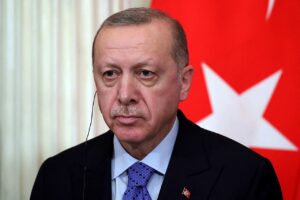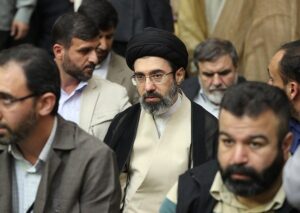The recent signing of a new “Comprehensive Security Integration and Prosperity Agreement” between the United States and Bahrain is meant to shore up a U.S.-led security order in the Persian Gulf and to complement a U.S.-led process of normalization of Arab countries’ relations with Israel.
Bahrain currently hosts the largest U.S. naval base in the region, the U.S. 5th Fleet, and is categorized a major non-NATO ally.
The new agreement does not include a provision like NATO’s Article 5 that would require America to treat any external attack on Bahrain as an attack on the U.S. Despite this, it is the most extensive security arrangement the U.S. has offered to an Arab country.
U.S. Secretary of State Antony Blinken said in signing the agreement that it would “strengthen coordination between our armed forces and the integration of our intelligence capacities, allowing us to even better deter and respond to threats as they arise… We’re looking forward to using this agreement as a framework for additional countries that may wish to join us in strengthening regional stability, economic cooperation, and technological innovation.”
The U.S. has failed in past efforts to create an “Arab NATO” including an integrated air defense system for the region. One of the goals of the new pact, according to Washington, is “to bolster Middle East regional security, stability, and prosperity by enhancing deterrence and defense integration and interoperability…. particularly in the air and maritime domain, to meet on a regular basis on ways to further integrate air and missile defense capabilities, special operations forces, intelligence capacity, cyber security, strategic communication, and mutual awareness of emerging threats.”
Despite repeated U.S. claims that it is “pivoting to Asia,” the Biden administration has doubled down on efforts to expand the Abraham Accords, which normalized Israeli relations with the United Arab Emirates, Bahrain, and Morocco, to include Saudi Arabia. President Joe Biden, in New Delhi for a recent G-20 summit, also announced creation of an Arab Mediterranean Corridor to connect India to Europe via the UAE and Saudi Arabia, Jordan, Israel and the Mediterranean. Along with expansion of cooperation in the I2U2 group of UAE, India, the U.S. and Israel, this new project is aimed at competing with China’s rising regional influence.
The latest U.S. announcements are in line with goals announced at the so-called Negev Forum, which brought together parties to the Abraham Accords plus Egypt.
At the first Negev summit in the Israeli desert in 2022, then Israeli Foreign Minister, Yair Lapid spoke of a “new regional architecture” to deter air and sea threats from Iran and its proxy forces. A second summit was planned for 2023 in Morocco but has not taken place because of Arab anger at the actions of the current right-wing Israeli government against the Palestinians.
Normalization of relations with Arabs and Israel’s inclusion into U.S. Central Command are part of Tel Aviv’s strategy to confront and contain the Islamic Republic.
In response, Iran is trying to improve its own relations with Saudi Arabia, Bahrain, and the UAE and to forestall a U.S.-Israel-Arab integrated air defense system. Iran is worried that a greater convergence of the Persian Gulf Arabs with Israel would cause a “balance deficit” against itself and its regional allies.
To counter this process of convergence, Iran is looking toward a “regional dialogue forum” of eight countries meeting on the sidelines of this year’s UN General Assembly. The meeting, at the initiative of the UN Secretary General, is based on UN Security Council Resolution 598, which ended the Iran-Iraq war in 1988, and is to include Iran, Iraq and the six Arab states in the Gulf Cooperation Council.
This idea, which was also pursued by the previous administration of Hassan Rouhani, did not win favor from Arab countries as tensions rose following the U.S. withdrawal from the 2015 nuclear deal in 2018.
Despite this, the initiative has received new attention following resumption of normal relations between Iran and Saudi Arabia in a deal brokered by China. However, it is unlikely to have major results.
The Biden government has shown its willingness to give stronger security guarantees to regional allies and is considering a stronger military commitment to Saudi Arabia – as well as provision of nuclear infrastructure – if Riyadh is willing to normalize relations with Israel.
Based on this, although the improvement of Saudi-Iran ties is considered a strategic decision by the two countries, the extent of the relations’ depth should not be exaggerated. Saudi Arabia’s goal is to reduce threats from Iran and its proxies in the event of a conflict between Iran and the U.S. or Iran and Israel. Riyadh remains concerned about Iran’s missiles and drones. At the same time, progress on resolving concerns about the Iranian nuclear issue could lead to a positive trend in Iran’s relations with Persian Gulf Arabs. However, Riyadh is unlikely to give up its desire to acquire an indigenous nuclear fuel cycle as long as Iran continues to enrich uranium.
The China factor should also not be overestimated. Even though the UAE and Saudi Arabia have expanded relations with China in reaction to the perception of a reduction of U.S. commitment to the region, the Persian Gulf security order can still be considered an American-led order for the foreseeable future.
Javad Heiran-Nia directs the Persian Gulf Studies Group at the Center for Scientific Research and Middle East Strategic Studies in Iran. He is currently working on a book about Iran’s middle class. Follow him on Twitter: @J_Heirannia.




